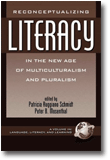
Reconceptualizing Literacy in the New Age of Multiculturalism and Pluralism
Edited by:
Patricia Ruggiano Schmidt, Le Moyne College
Peter B. Mosenthal, Syracuse University
A volume in the series: Literacy, Language and Learning. Editor(s): Claudia Finkbeiner, Universitaet Kassel. Wen Ma, Le Moyne College.
Published 2001
This book offers a array of essays with challenging ideas and provoking new analyses of power asymmetries, multiple epistemologies and vital con-cerns for the education of a different America, the America of new immi-grants, people of color with other cultures, languages and values. The new American that many want to ignore and is becoming the only America. This book also forces us to reflect on the educational challenges we must face, especially in teacher education and the preparation of intellectual leaders. None of the major agenda items associated with a new era of social justice can be either comprehended or accomplished without a profound understanding of multicultural literacy, and of its relationship to ethnic, racial, cultural and linguistic diversity. While in previous decades we used frequently a rhetoric of multiculturalism (at a safe distance), today we are living multiculturalism and practicing ethnic, cultural and racial diversity in our daily lives as we seek a marriage partner, a business associate, a friend, a church. Most of all, we must live multiculturalism as we go school and see children’s faces. There is no way to escape the reality of ethnic, racial and linguistic diversity as it comes entangled with many other cul-tural and class differences between and within each group we encounter. Suddenly, an abrupt awakening for many mainstream educators, what was peculiar of some areas in the Southwest, has become common scenario in most metropolis and large cities. The present volume brings us face to face with issues and challenges we can no longer sweep under the rug. This outstanding volume lays down a solid general conceptual foundation that permits us to link our theoretical past with the post-modern era. It also provides a clear context for the dis-cussion of contrasting notions of monocultural literacy and the relation-ship of literacy and power. The volume goes on to deal with the relationship of literacy and culture (actually to specific cultures, especially African American). At this point the discourse turns to strategies for incor-porating minority perspectives into the literacy curriculum and including the home cultures of disenfranchised peoples. The last section of the book offers help on the practical issues of teacher education for student popula-tions often ignored, and linkages between schools and homes in order to empower the disenfranchised and isolated.
CONTENTS
Introduction, Peter B. Mosenthal and Patricia Ruggiano Schmidt. Part I. Theoretical Framework. Chapter 1: Frameworks for Understanding Multicultural Literacies, Georgia Earnest Garcia and Arlette Ingram Willis. Chapter 2: Multicultural Belief: A Global or Domain-Specifice Construct? An Analysis of Four Case Studies, Jyotsna Pattnaik. Part II. Power Issues. Chapter 3: Multicultural Literacy: The Power of Print, Pedagogy, and Epistemological Blindness, Dawnene D. Hammerberg and Carl Grant. Chapter 4: Liberating Literacy, Margaret C. Laughlin, Herbert Martin, Jr., and Christine E. Sleeter. Chapter 5: Taking Ownership of Literacy: Who Has the Power?, Patricia A. Edwards, Jennifer Danridge, Gwendolyn T. McMillon, and Heather M. Pleasants. Part III. Literacy and Culture. Chapter 6: An African-Centered Perspective on Literacy: Promise and Possibilities, Barbara J. Diamond. Chapter 7: Reading, Language, Culture, and Ethnic Minority Students, Jon Reyhner and Ward Cockrum. Chapter 8: Best Practice(s)? The Cultural Discourse of Developmentalism in American Early Education: A Cross-Cultural Comparison, Diane M. Hoffman. Chapter 9: African American Young Adult Science Fiction and Fantasy Literature: Realism for the 21st Century, Randy F. Rush. Chapter 10: Rocks in the Brook: A Teacher Educator’s Reflections, Arlette Ingram Willis. Part IV. Strategies for Connecting with Minority Perspectives. Chapter 11: English Language Learners’ Reading: A New Age Issue, Jill Fitzgerald. Chapter 12: Home-School Collaboration: Successful Models in the Hispanic Community, Flora V. Rodriguez-Brown. Chapter 13: Getting the Most Out of School-Based Professional Development, William M. Saunders, Gisela O’Brien, David Marcelletti, Kathy Hasenstab, Tina Saldvar, and Claude Goldenberg. Part V. Teacher Education. Chapter 14: Preservice Teachers Connect Multicultural Knowledge and Perspectives with Literacy Instruction for Minority Students, Hong Xu. Chapter 15: ‘Raccoon? Wass Dat?’ Hawaiian Preservice Teachers Reconceptualize Culture, Literacy, and Schooling, Margaret J. Maaka, Kathryn H. Au, Yvonne K. Lefcourt, and L. Pauahi Bogac. Chapter 16: Understanding Culture in our Lives and Work: Teachers Literature Study in the Book Club Program, Taffy E. Raphael, Karen Damphousse, Kathy Highfield, and Susan Florio-Ruane. Chapter 17: The Power to Empower: Creating Home/School Relationships with the ABC’s of Cultural Understanding and Communication, Patricia Ruggiano Schmidt.
-
Paperback978-1-930608-90-0
Web price: $62.04 (Reg. 72.99)
-
Hardcover978-1-930608-91-7
Web price: $89.24 (Reg. 104.99)
- eBook9781607529439

-
 Authentic Voices
Culturally Responsive Teaching and Learning
Authentic Voices
Culturally Responsive Teaching and Learning
-
 Collaborative Learning in a Global World
Collaborative Learning in a Global World
-
 Educational Practices in China, Korea, and the United States
Reflections from a Study Abroad Experience
Educational Practices in China, Korea, and the United States
Reflections from a Study Abroad Experience
-
 Innovative Approaches to Teaching Multilingual Students
Innovative Approaches to Teaching Multilingual Students
-
 Listening to the Voices of Boys
Exploring the Motivation of Primary Boys to Engage in Reading
Listening to the Voices of Boys
Exploring the Motivation of Primary Boys to Engage in Reading
-
 Reconceptualizing Literacy in the New Age of Multiculturalism and Pluralism
2nd Edition
Reconceptualizing Literacy in the New Age of Multiculturalism and Pluralism
2nd Edition
-
 Views from Inside
Languages, Cultures, and Schooling for K‐12 Educators
Views from Inside
Languages, Cultures, and Schooling for K‐12 Educators

